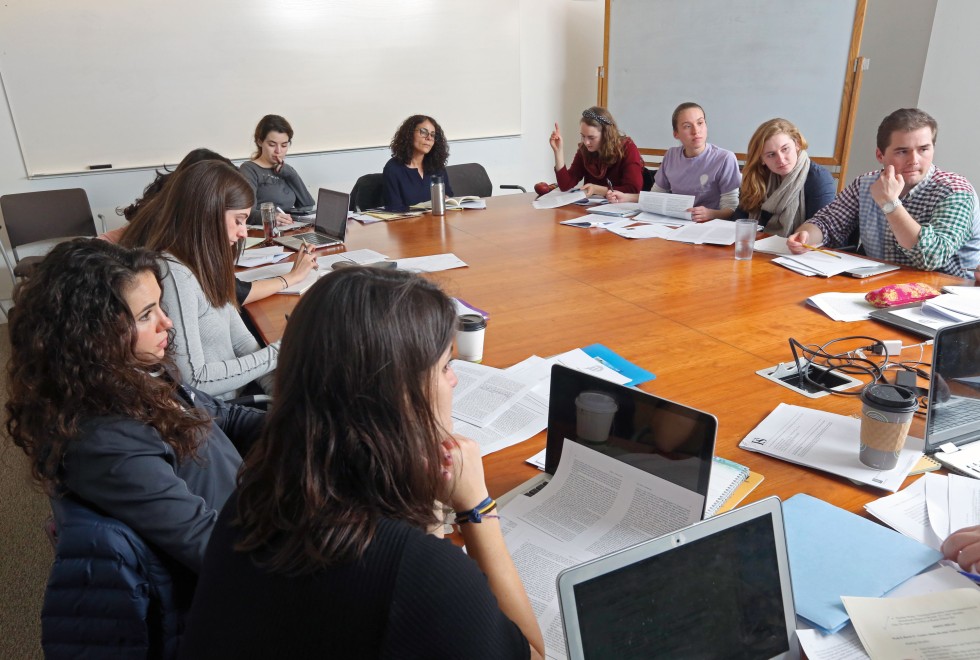Making Waves
Kenyon’s swimming and diving program is having a ripple effect far beyond Gambier through the swimmers who have…
Read The StoryStudents learn about art and humanity in “The Middle East Through Film and Fiction,” taught by Nurten Kilic-Schubel.

WHEN & WHERE: Mondays, 7 – 10 p.m., Oden Hall 300
Years ago, when Nurten Kilic-Schubel decided to teach a history course about the modern Middle East using movies and novels instead of traditional textbooks, she ran into a significant problem. “At the time, there were very few works available,” she said. In a pre-streaming world, finding films from Turkey, Iran, Egypt, Algeria, Palestine, Afghanistan and other places in the region was a tall order. Fortunately, she had a solution close at hand: “I have a huge collection of films, so I used my own personal copies.”
Much has changed since then as access to international cinematic material has exploded thanks to Netflix and other streaming platforms. But Kilic-Schubel’s belief in the mission of her course, HIST 365 (“Middle East Through Film and Fiction”) remains. “Students have, in general, a sense that the Middle East is this very homogenized place, and then they encounter — with really diverse, dynamic reach — incredibly innovative works of art, whether literature or film,” she said. “That really opens up their world. There’s a broader, richer cultural world and aes-thetic world in the Middle East beyond politics, war and revolution.”
It’s important to recognize, she said, that the class is neither a literature class nor a film course. “It is a history class that uses the medium of film and novels as a means for helping students explore the complex, layered histories and really diverse cultures of the region.”
The seminar’s syllabus includes an ever-changing selection of works from artists from throughout the Middle East, as well as examples of Western imaginings of the region. Students learn about legacies of colonialism, issues of gender and social divisions, the chang-ing roles of religion, responses to development and globalization, and more. “Cairo Station,” for example, is a 1958 crime drama by the Egyptian director Youssef Chahine that is set in a train station and offers a powerful portrait of the major social, economic and political transformations taking place in the country in the 1950s.
An associate professor of history who joined Kenyon in 2001, Kilic-Schubel has spent a significant amount of time in Central Asia, having received three degrees from universities in Turkey and serving as a Fulbright scholar in Kyrgyzstan in 2010. She said the course aims to expose students to the global humanities in a meaningful way. “Students who might otherwise think of the people of the Middle East as ‘the other’ find themselves identifying with the lives and struggles of the characters in the films or novels and come to see their shared humanity.”
“In Case of Emergency” by Mahsa Mohebali
“Minor Detail” by Adania Shibli
“Cairo Station,” 1958, dir. Youssef Chahine (Egypt)
“Battle of Algiers,” 1966, dir. Gillo Pontecorvo (Algeria/France)
“A Separation,” 2011, Asghar Farhadi (Iran)
“Costa Brava, Lebanon,” 2021, dir. Mounia Akl (Lebanon)
Kenyon’s swimming and diving program is having a ripple effect far beyond Gambier through the swimmers who have…
Read The StoryCraftsmanship and entrepreneurial acumen collide in the buzzworthy food prints of Anastasia Inciardi ’19.
Read The StoryAs college admissions adapts to an ever-shifting and increasingly competitive landscape, we break down what has…
Read The Story